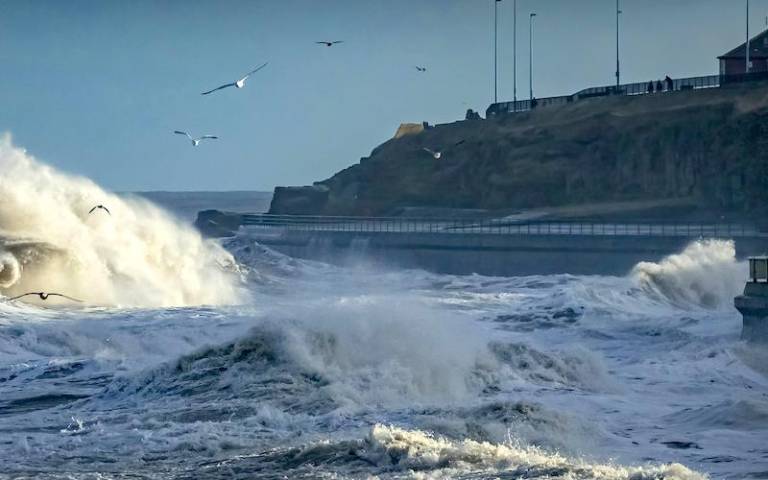UCL contributes to climate emergency ‘Deep Dive’ on the risks our changing climate poses to Heritage
20 March 2024
UCL Institute for Sustainable Heritage researchers Scott Orr and Josep Grau-Bove collaborate on the staging of timely National Heritage Science Forum event looking at the problems and potential solutions

How is global warming affecting cultural heritage, and what can we do to mitigate these impacts? This was the focus of the Climate Emergency “Deep Dive” held in January by the National Heritage Science Forum, in close collaboration with the UCL Institute for Sustainable Heritage.
Heritage will be faced with a future in the UK that will be warmer, wetter and windier. Peter Brimblecome (Emeritus Professor of Atmospheric Chemistry at both the University of East Anglia and National Sun Yat-sen University in Taiwan) was the keynote speaker at the event, pointed out the high complexity and apparent contradictions in future climate predictions, which mean that our future could be simultaneously sunnier and wetter because there will be longer summers, but with stronger and more frequent wind-driven events. His presentation set the tone by providing a detailed list of challenges to heritage, such as increased impacts of pests or more frequent salt damage in monuments.
This was not, however, an event focused only on challenges. A range of speakers covered mitigation and adaptation strategies, as well as innovative ways to measure and communicate risks to heritage. In her talk at the event, UCL Institute for Sustainable Heritage researcher Helen Thomas demonstrated how the unassuming pillars on top of every British hill (the Trig pillars) can be one of the keys to map and observe in real time the effects of climate change. As the pillars are all of similar materials, closely monitored by an engaged community of hillwalkers, and distributed around the country, they can be seen as sensors which indicate the impact of climate on our built world.
The event was a call for action, a step forward for the sector, rather than a recap of previous work, in two ways. Firstly, the event focused on real consultation with the public: it began with a community consultation aimed at identifying research gaps and priorities in which participants are encouraged to contribute their perspectives on the main challenges within the pillars of risk, mitigation, and adaptation. This had two elements, an online noticeboard set up for submissions, and open public forum events which will follow it in the Spring. So far, one of the key messages received through community contributions is that there is a real need to consider the effects of climate change on intangible heritage. Secondly, the deep dive event was a tangible demonstration that tackling the climate crisis requires bringing together a real diversity of voices: among the speakers, there were conservators, heritage managers, climate scientists, engineers, architects and data scientists.
The expert contributions made during the event sessions evidenced in a very tangible way how disciplines can come together. Pedro Rocha of the National Archives introduced the use of 3D models based on gaming engines to aggregate climate data and explore the location of sensors in a virtual environment. Katherine Shingler from the National Trust presented a range of climate adaptation initiatives, for example the work of the Trust in creating a priority list of the most vulnerable coastal historic assets. David Thickett from English Heritage presented green conservation methods that help reduce the impacts of preserving objects, e.g. green products to stabilise the corrosion of copper. In all, the event demonstrated the real challenges posed to our Heritage by the climate crisis, but also what we can do collectively to mitigate the risks and preserve our past for the future.
Links
- Learn more about the work of Josep Grau-Bove - access this internal webpage.
- Learn more about the work of Scott Orr - access this internal webpage.
Image credit: pexels.com
 Close
Close

